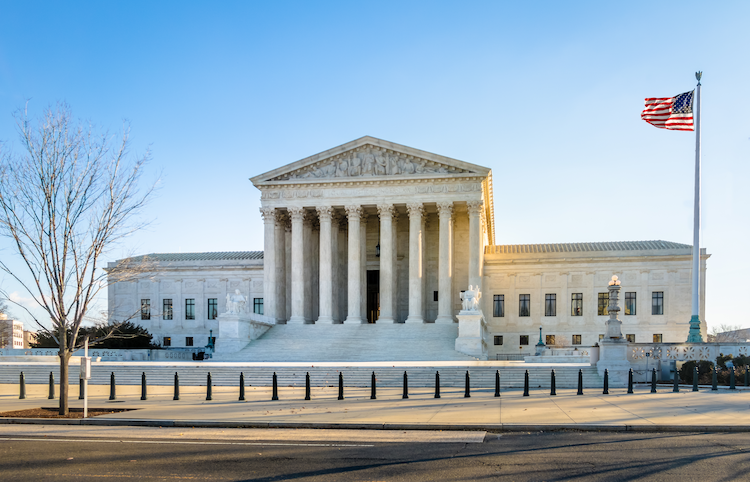Supreme Court Kicks Off 2023-2024 Term with Oral Arguments in Three Cases

The U.S. Supreme Court returned to the bench on October 2, 2023. The justices heard three oral arguments in the first week of the new term and considered issues ranging from a civil rights tester’s right to sue to federal sentencing laws to the constitutionality of the Consumer Financial Protection Bureau.
The most closely watched case of the week was Consumer Financial Protection Bureau v. Community Financial Services Association, which challenges the mechanism used to fund the CFPB. The consumer watchdog has survived previous legal challenges and may again escape unscathed.
In challenging the CFPB’s 2017 Payday Lending Rule, the Community Financial Services Association of America challenged the bureau’s funding mechanism. The CFPB is not funded by congressional appropriations, but rather directly from the Federal Reserve. The Fifth Circuit Court of Appeals held that this funding structure violates Article I, Section 9 of the Constitution (the Appropriations Clause), which provides that “[n]o money shall be withdrawn from the Treasury, but in Consequence of Appropriations made by Law.”
In granting certiorari, the justices have agreed to decide the following question: “Whether the court of appeals erred in holding that the statute providing funding to the Consumer Financial Protection Bureau, 12 U.S.C. § 5497, violates the appropriations clause in Article I, Section 9 of the Constitution, and in vacating a regulation promulgated at a time when the Bureau was receiving such funding.”
The Supreme Court also heard oral arguments in Pulsifer v. United States. The criminal sentencing case involves whether a defendant satisfies the criteria in 18 U.S.C. § 3553(f)(1) as amended by the First Step Act of 2018 in order to qualify for the federal drug-sentencing “safety valve” provision so long as he does not have (a) more than four criminal history points, (b) a three-point offense, and (c) a two-point offense, or whether the defendant satisfies the criteria so long as he does not have (a), (b), or (c).
Finally, the justices considered Acheson Hotels, LLC v. Laufer. The case raises an issue that has divided the federal courts of appeal — when civil rights testers have standing to sue. The plaintiff, Deborah Laufer, has filed hundreds of lawsuits alleging that hotel websites violated the ADA because they failed to contain enough information about the accommodations for people with disabilities. While the district court dismissed her suit against Acheson Hotels for lack of standing, the First Circuit Court of Appeals reversed. It held that the denial of accessibility information was an actionable Article III injury.
Three other federal appeals courts have rejected “tester” standing on identical facts. On appeal, the specific question before the Court is “whether a self-appointed Americans with Disabilities Act ‘tester’ has Article III standing to challenge a place of public accommodation’s failure to provide disability accessibility information on its website, even if she lacks any intention of visiting that place of public accommodation.”
The Court, however, may never reach the central issue in the case. During oral arguments, several justices raised concerns that the case could be moot given that Laufer dismissed her suit against Acheson, which no longer owns the offending hotel. “So this is, like, dead, dead, dead in all the ways that something can be dead,” Justice Elena Kagan said during oral arguments. “And to use that case as the vehicle for deciding an important issue, an issue that probably is going to need to be decided at some point but surely could come up in a live case, I guess it just doesn’t seem like something that a court should be anxious to do.” Decisions in all three cases will be rendered before the term ends in June 2024. Please check back for updates.
Previous Articles
SCOTUS Rules State Can’t Immunize Parties from Federal Civil Liability
by DONALD SCARINCI on January 29, 2026
In John Doe v. Dynamic Physical Therapy, LLC, 607 U.S. ____ (2025) the U.S. Supreme Court held that...
Supreme Court to Address Racial Discrimination in Jury Selection
by DONALD SCARINCI onWhile the U.S. Supreme Court has concluded oral arguments for the year, it continues to add cases t...
Supreme Court Halts Deployment of National Guard to Chicago
by DONALD SCARINCI on
In Trump v. Illinois, 607 U.S. ____ (2025), the U.S. Supreme Court refused to stay a district court...
The Amendments
-
Amendment1
- Establishment ClauseFree Exercise Clause
- Freedom of Speech
- Freedoms of Press
- Freedom of Assembly, and Petitition
-
Amendment2
- The Right to Bear Arms
-
Amendment4
- Unreasonable Searches and Seizures
-
Amendment5
- Due Process
- Eminent Domain
- Rights of Criminal Defendants
Preamble to the Bill of Rights
Congress of the United States begun and held at the City of New-York, on Wednesday the fourth of March, one thousand seven hundred and eighty nine.
THE Conventions of a number of the States, having at the time of their adopting the Constitution, expressed a desire, in order to prevent misconstruction or abuse of its powers, that further declaratory and restrictive clauses should be added: And as extending the ground of public confidence in the Government, will best ensure the beneficent ends of its institution.





